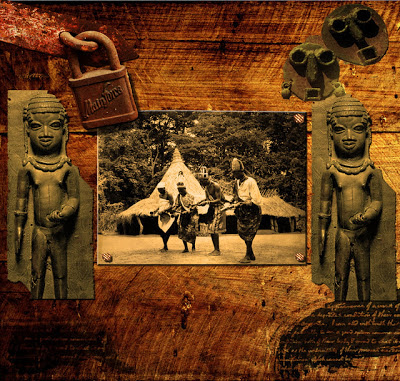For a long time, I wanted to bring together the different Poly-Rythmo's recording on label Badmos. Gbadamassi Raimi from Nigeria, creator and producer of Badmos, has edited ten 7 inches of Poly-Rythmo, here are six volumes. Each numbers were composed by different members of the band. These recordings made in Ivory Coast in 1976 thanks to the Beninese musician and composer Gilbert Dossou have a distinctive and unique sound.
Il y a longtemps que je voulais rassembler les différents disques enregistrés sur le label Ivoirien Badmos par le Tout Puissant Poly-Rythmo. Gbadamassi Raimi, du Nigeria, créateur du label Badmos a produit dix 45 tours avec le Poly-Rythmo, en voici six volumes. Chaque numéros ont été composés par différents musiciens du groupe. Ces enregistrements réalisés en Côte d'Ivoire en 1976 grâce au musicien et arrangeur Gilbert Dossou ont un son particulier et unique.
This record seems to be a Poly-Rythmo's prelude on label Badmos. Side 1 is a jerk and side 2 is a really interesting pachenga: "Boyi Kaka". Both titles have been composed by band leader Clément Mélomé.
Ce disque est vraisemblablement le prélude à la série d'enregistrements de Poly-Rythmo sur le label. La face A est un jerk poly-rythmique et la face B une pachenga très intéressante: "Boyi Kaka". Les deux morceaux ont été composé par le leader Clément Mélomé.

No. 2 was composed by the singer Lohento Eskill. Title "Noubi Le Wede" is a pachenga rhythm and "Gbe Ho" a modernized traditional rhythm. As always the voice of Lohento Eskill transcends Poly-Rythmo's music.
Le Numéro 2 a été composé par le chanteur Lohento Eskill. Le titre "Noubi Le Wèdé" est un rythme pachenga et "Gbê Ho" un rythme traditionnel modernisé. Comme toujours, la voix de Lohento Eskill transcende la musique du Poly-Rythmo.
N° 3 was composed by drummer Yehouessi Leopold. Both titles are called "pop". Personally, I think this volume is one of the best, especially the song "Aooida".
Le numéro 3 a été composé par le batteur Yehouessi Léopold. Les deux titres sont qualifiés de "pop". Personnellement, je pense que ce volume est un des meilleurs en particulier le morceau "Aooida".
N° 4 was composed by bassist Bentho Gustave. The song "Alissa We Dje" is a modernized traditional rhythm. "Kossi Dagba Houtro" is an highlife rhythm sung in Mina language from west Benin.
Le numéro 4 a été composé par le bassiste Bentho Gustave. Le morceau "Alissa Wê Djê Ha Gbê" est un rythme traditionnel modernisé. "Kossi Dagbé Houtro" est rythme highlife chanté en langue Mina de l'Ouest du Bénin.
N° 5 was composed by saxophonist Loko Pierre. The song "Djoba Gbele" is a soukous rhythm and "Oh Pierre" a pop rhythm.
Le numéro 5 a été composé par le saxophoniste Loko Pierre. Le morceau "Djoba Gbélé" est un rythme soukous et "Oh Pierre" un rythme pop.
Thanks to Ogoun Ferraille the rare No. 6 composed by Vincent Ahéhéhéhinou. I only have the title "Pourquoi pas" and I know you will answer "Why Not" the other title ?
Sorry don't be too greedy.
Grace à Ogoun Ferraille, voici le N°6 composé par Vincent Ahéhéhinou. Je n'ai qu'un titre: "Pourquoi Pas" et vous allez me répondre pourquoi pas l'autre titre. Désolé ne soyez pas trop gourmands.
Number 7 has been composed and sung by Clément Mélomé. Title "Je suis pressé" is a jerk rhythm and side 2 is folklore's or Sato rhythm if you prefer. This record is not the best for me but as Number 6, it is really rare and hard to find.
Le numéro 7 a été composé et chanté par Clément Mélomé. Le titre "Je suis pressé" est un rythme Jerk à la mode béninoise alors que le face B est un rythme folklorique ou Sato si vous préférez. Ce disque n'est pas le meilleur pour moi mais il est rare et difficile à trouver.

N° 8 is composed and sung by the leader Clement Melome. Both titles are called "special pop", an obscure term that more defines a modenized traditional rhythm.
Le numéro 8 est composé et chanté par le leader Mélomé Clément. Les deux morceaux sont qualifiés de special pop, un terme obscure qui définit plutôt un rythme sato ou traditionnel modernisé.
The last was composed by Gilbert Dossou aka Prince Dgib's and sung by Lohento Eskill. It is the one I prefer. The "pop" atmosphere is great and for the first time on a Poly-Rythmo's recording ("Salowa") you can hear the gangan drum or talking-drum.
Enfin, le dernier a été composé par Gilbert Dossou alias Prince Dgib's et chanté par Lohent Eskill. Pour moi c'est le meilleur. L'ambiance pop du disque est identifiable et pour la première fois sur un morceau exécuté Par poly-Rythmo ("Salowa") on peut entendre le tambour "gangan" ou"talking drum".






+oror.jpg)





.jpg)

.jpg)

.jpg)
+front.jpg)


.jpg)
.jpg)
%2Bnew.jpg)






.jpeg)









.jpg)
.jpg)

.jpg)
.jpg)
.jpg)